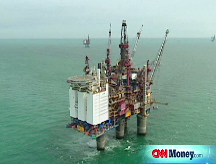Oil up 38% since Christmas
Crude prices continue to rise as concern that Israel's move into Gaza could lead to a withholding of supply paces the futures advance.
NEW YORK (CNNMoney.com) -- Oil prices soared again Monday - moving closer to the $50 mark - as the movement of Israeli forces into the Gaza Strip this weekend added to worries about Middle East supply disruption.
U.S. crude for February delivery rose $2.47, or more than 5%, to settle at $48.81 a barrel. It rose as high as $49.28 before easing.
It was the fifth gain for oil in the past six sessions, rising 38% in that span from a close of $35.35 on Dec. 24.
Prices have risen in recent days as investors worried that fighting in the Middle East could lead to a withholding of supplies from a major oil producing nation such as Iran.
"That's a wild card all the time (Israel gets involved in a conflict), but that's really hard to imagine," said James Cordier, founder of brokerage OptionSellers.com in Tampa, Fla.
An Iranian military commander called on Islamic nations Sunday to pressure Israel's Western allies by withholding crude oil supplies. However, a source within the Organization of Petroleum Exporting Countries, of which Iran is a member, said the implementation of any such plan was "very unlikely," according to Reuters.
"The reality is there's no oil involved," said James Williams, energy economist with WTRG Economics in London, Ark.
Israel and the Gaza Strip are not major oil producers.
The last major crude disruption resulting from a conflict involving Israel came in 1973 with the Middle East oil embargo, Williams said.
That year, Middle Eastern nations withheld exports in protest over American support of Israel during the Yom Kippur war.
2009 bulls: Prices also rose as a lot of commodity investors, who had been waiting in the wings toward the end of 2008, began making their first 2009 purchases, according to Cordier.
The first official day of 2009 oil trading was Friday, but because it was not a full week due to the New Year holiday, the number of trades in the market was relatively low.
"A lot of (investors) were sidelined at the end of last year," said Cordier. "The stock market has been in flux, so much that people are looking for an alternative investment."
Commodities may be that alternative, and some investors are looking for long-term bets, he added.
Russia: Investors have also been keeping a wary eye on Russia after its state-owned energy company held back deliveries of natural gas last week from neighboring Ukraine due to a contract dispute.
The move has already reduced the flow of energy supplies to the Czech Republic, Turkey and other Eastern European nations, according to reports.
While the current dispute does not involve crude oil, it points out Europe's precarious position of relying on Russia for most of its energy needs, according to Williams.
"I think (Russian Prime Minister Vladimir) Putin has pretty well demonstrated he will use energy as a policy tool," added Williams.
Many investors have been worried over the past several months that Russia, a major oil producer, may try to follow in the footsteps of OPEC and cut production or take some other coordinated action in an effort to boost prices.
Demand: Crude oil prices have fallen more than $100 a barrel since hitting a record $147.27 a barrel last year as demand worries began to appear.
Demand for crude has fallen off dramatically following an unprecedented slowdown in global economic activity, but supplies have remained steady, according to Michael Lynch, president of energy advisory Strategic Energy & Economic Research, Inc.
"We still have a lot of surplus oil on the market and in storage," he said.
Concern about the economy shows no sign of abating. In the United States, the world's largest oil consumer, President-elect Barack Obama was set to push an economic stimulus package that could cost between $675 and $775 billion.
And monetary policy officials at the Federal Reserve and the European Central Bank geared up for what could be a lengthy fight against currency deflation.
The market will be looking to see what kind of impact production cuts from OPEC will have on inventories, according to Lynch.
OPEC: OPEC, whose members produce about 40% of the world's oil, has been increasingly concerned about the price of crude oil over the past several months.
At the end of last year, OPEC pledged to bolster prices by reducing production by 2.2 million barrels a day starting this month.
The group is also mulling another emergency meeting in Kuwait in February to discuss production levels, according to reports.
The low price of oil has also prompted China to continue expanding its strategic energy stockpiles. The United States has also taken the opportunity to resume filling the Strategic Petroleum Reserve.
"Because prices are cheap, this is a good buying opportunity (for them)," said Lynch.
Talkback: Have you tried to do a mortgage work-out? Was it successful or a failure? E-mail realstories@cnnmoney.com and your story could be included in an upcoming article. ![]()



